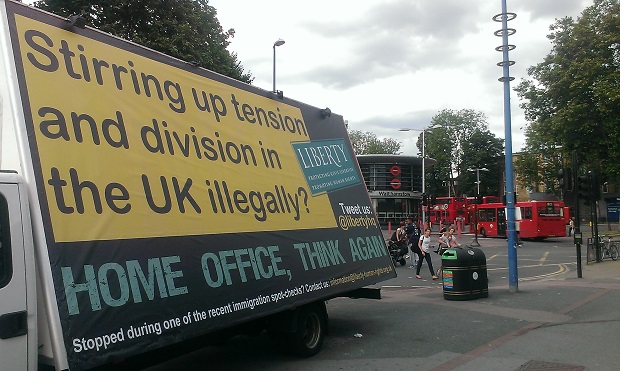When most people think of mobile billboard campaign, they imagine brands promoting local deals, public events, or big political campaigns. But back in 2013, this high-impact advertising format became the unlikely centre of a national debate on immigration, civil liberties, and public accountability.
The UK Government’s now-infamous ‘Go Home’ AdVans were deployed in several London boroughs as part of a pilot scheme aimed at encouraging illegal immigrants to leave the country voluntarily. The message, displayed in stark black-and-white text, read: “In the UK illegally? Go home or face arrest.” These mobile billboard advertising trucks were driven around diverse communities, some of which already faced tensions and distrust in their relationships with authorities.
While it may have grabbed headlines, the campaign quickly sparked outrage. Critics described it as inflammatory, divisive, and reminiscent of far-right slogans. Prominent politicians across the political spectrum – including Labour’s Yvette Cooper, Lib Dem leader Nick Clegg, and UKIP representatives – joined a wave of public figures in condemning the tactic.
A Public Response on Wheels
As controversy mounted, one civil rights organisation decided to hit back in the same format the Government used. Liberty, the long-standing human rights group, launched its own mobile billboard advertising campaign in direct response to the Home Office initiative. The organisation partnered with Gorilla Media to roll out alternative AdVans carrying counter-messages like “Proud to be British. Proud to be Migrant” and “Home Office: Think Again.”
This moment marked a turning point – not just in the immigration debate, but also in how a mobile billboard campaign was seen by the public and media. No longer simply a marketing tool, it became a platform for real-time social commentary and resistance.
The Liberty vans travelled through the same areas targeted by the original campaign, offering a visible sign that not everyone agreed with the Government’s tone or tactics. By reclaiming the streets with a different message, Liberty used a mobile billboard campaign to spark conversations, amplify marginalised voices, and shift the narrative.
Government Retraction and Public Scrutiny
Under mounting pressure, then-Home Secretary Theresa May eventually scrapped the pilot scheme, describing the vans as “too much of a blunt instrument.” A government-commissioned report noted that while 125 people came forward following the campaign, only 11 could be directly attributed to the AdVans themselves.
In hindsight, the numbers tell one story, but the public reaction tells another. The campaign became a case study in how message delivery – especially when using bold formats like mobile billboard advertising – can carry unintended consequences.
The economic, social, and emotional impact of this campaign is now the focus of an 18-month academic research project jointly led by the University of Glasgow and the University of Warwick. Funded by the Economic and Social Research Council to the tune of £200,000, the study aims to explore how such policies affect migrants, communities, and public discourse.
As Dr Emma Jackson from the University of Glasgow put it: “We need to understand how such policies affect the lives of migrants, local communities and good community relations.”
Reclaiming the Format
At Gorilla Media, we’ve always believed that mobile billboard advertising is more than a space for logos and taglines. It’s a powerful, flexible medium that can raise awareness, drive action, and challenge the status quo. Whether it’s a national brand launch or a grassroots social justice message, the strength of a mobile billboard campaign lies in its ability to show up in the heart of communities – on their terms.
The Liberty campaign stands as a bold example of how organisations can reclaim tools typically used by institutions and redirect them for advocacy and solidarity. It also proves that impact isn’t just about volume or repetition – it’s about relevance, location, and timing.
Why Mobile Billboard Advertising Still Matters
Today, as public trust in traditional media continues to fluctuate, mobile billboard advertising offers a rare blend of visibility and authenticity. It’s not filtered through algorithms, it’s not hidden behind a paywall, and it doesn’t disappear after five seconds. It rolls through city streets, stands tall at public events, and can be as subtle or provocative as the message demands.
Whether you’re a charity fighting for change, a business seeking exposure, or a local authority promoting a public service, the potential is vast. Just ask Liberty – or any number of campaigners who’ve taken their message to the streets.
Want your message to go beyond clicks and screens? At Gorilla Media, we help brands, causes, and communities bring powerful ideas to life through mobile billboard advertising. Get in touch to start your campaign today.

